Let's strengthen our bond as storytellers, develop a deep sense of respect for what each individual brings forward and help each other grow as one flourishing creative community.
By Michael Canton
Published February 21, 2014
Last week, the Hamilton Media Guild hosted its first major event after a successful launch in 2013 at the Radius Cafe. The event, entitled "Doing Media Differently," was held on Wednesday February the 12 at the gorgeous Lincoln Alexander Centre in Hamilton, Ontario.
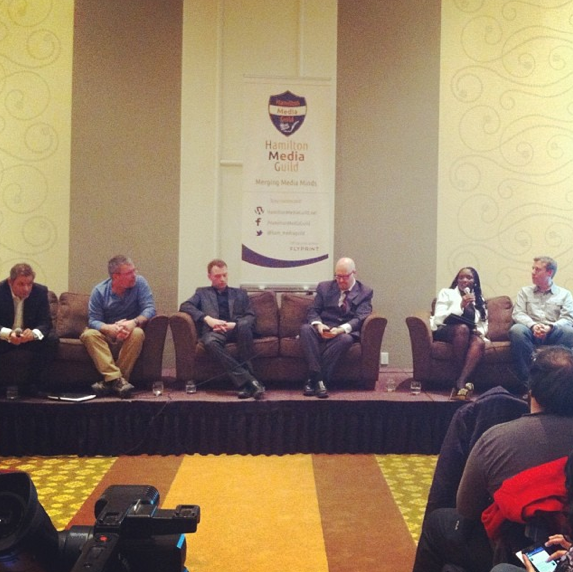
Doing Media Differently panel, from left: Jim Poling, Matthew Ingram, Martinus Geleynse, Jamie Smith, May-Marie Duwai-Sowa, and Ryan McGreal
"Doing Media Differently" was a panel discussion with some of Hamilton's most prestigious media trailblazers, having carved their own path and unique course and thus changing the way we look at journalism today in Hamilton.
The panel consisted of Ryan McGreal of Raise the Hammer, May-Marie Duwai-Sowa of Illuminessence, Jamie "Gunner" Smith of In the Neighbourhood, Martinus Geleynse of MGI Media and Mathew Ingram of GigaOm. It was moderated by Jim Poling, managing editor at the Hamilton Spectator.
The vision of the Hamilton Media Guild is to align the stars, in our wonderfully ambitious city, arranging important open discussions between the knowledgable and trendsetters with those who wish to learn more about the changing media landscape that is growing here in Hamilton.
By facilitating opportunities for networking, panel discussions and undoubtedly workshops in the near future, the HMG is creating potential collisions to help grow a self-sustaining infrastructure that will keep future media students here in our city, sharing knowledge and expertise and fostering talent and resources to create better storytellers out of us all.
I am super-ecstatic that something of this nature was created here in Hamilton, where I might find local, like-minded individuals with whom I can connect and form potential partnerships on future projects.
I also enjoy being inspired by other creative minds and hearing their stories of trial and tribulation, relatable conundrums we all face in this fast-paced digital media realm, where not even corporate companies are safe anymore and forcibly have to downsize.
So kudos to the team at HMG for stepping up to the plate and delivering a unique two-way discussion where we all can tap into and learn from one another.
"Doing Media Differently" was a sold-out success. Young and old alike came out to hear what knowledge the panelists could share through their experiences and where they saw the future of journalism in Hamilton.
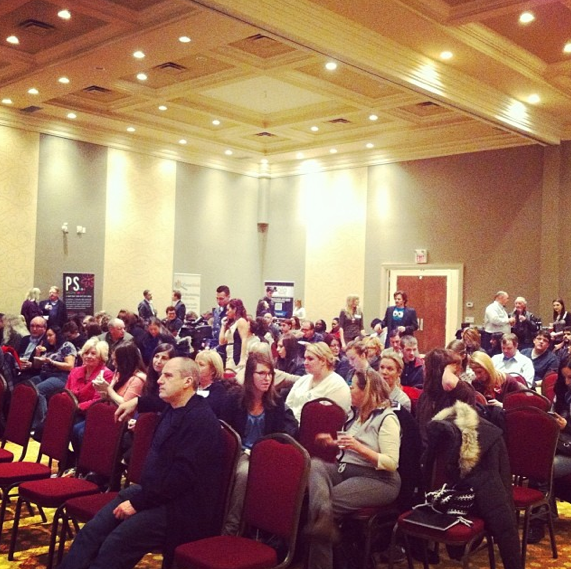
The event was sold out
The discussion began with a brief introduction to each individual and what they have created to get them a seat on that comfy couch to speak about the "business model" behind each creation.
Raise the Hammer is a website one can go if one is interested in urban issues that affect us all. It offers ideas and solutions to make Hamilton a livable and more vibrant city to lay down potential roots in. Raise the Hammer is a sharing community of passionate citizens. Their "business model" rests heavily on the voluntary contribution / participation of others who share in their passion for the city.
The secret to our success in Raise the Hammer in business is we just decided we weren't going to play. Right from the start we decided we would be strictly non-commerical, non-for-profit. We don't bring in any revenue of any kind, we don't pay anybody of any kind.
It costs $10 a month to host the website, $10 a year to register the domain. Those are our only expenses, and so the way we are able to operate is that, because nobody is making any money off the enterprise and because we kind of have a civic engagement focus, Raise the Hammer is more of a public discourse rather than an enterprise or a business, so people are willing to write and contribute and not expect to get paid for it.
My background is a software developer and almost all the software I use is free and open source software. Programs that have been written for people by people and then given away for free and that kind of sharing philosophy or sharing culture. People are willing to contribute because on one hand they want to be seen and recognized, and they want to give back and I think that same kind of philosophy is what drives Raise the Hammer.
— Ryan McGreal
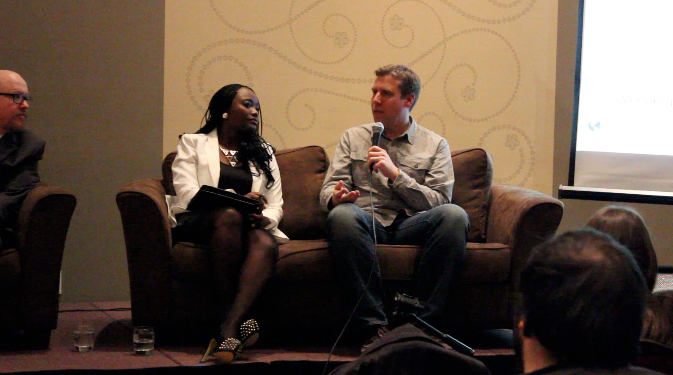
May-Marie Duwai-Sowa and Ryan McGreal
Illuminessece is a lifestyle e-magazine aimed at celebrating Hamilton's young professional women and their accomplishments. While they do have hyper-local roots, their "business model" also reaches a global audience.
Engaging in multi-platform conversations, their aim is to also discuss relatable issues that effect professional women not just in Hamilton but in other cities as well.
We have to work across different mediums, so having the magazine is one platform, but, now we again launch The Chat with Illuminessence because we realized people want to have conversations with us.
We have fantastic contributors and writers and people want to hear what they have to say, they want to get their opinions, as well as try to showcase people we feature on a broader scale. Where they can also share their experiences or success journeys as well.
This platform will also broaden that audience we also have but also build that connectivity, that's really important on a multi-media platform.
— May-Marie Duwai-Sowa
Once a radio program on CFMU, turned internet podcast, their "business model" relies heavily on going to find the stories of interest. Again a hyper-Local approach, but since moving from radio to podcast, they are now been given complete freedom to approach the show in a more mobile fashion.
Going to to the stories themselves rather than bringing the stories to them makes "In the Neighbourhood" very much field reporting by going to various local people and businesses in the city and giving them a voice on a digital platform.
Our model is actually going to find the stories where we go to a certain ward in the city and sit down with a shop owner or someone from that neighbourhood and we talk to them. What effects your neighbourhood, what is going on here, what do you have to say about politics, what do you have to say about the hole in the room, what do you have to say about Hamilton. And because of that there is great interest in the website.
— Jamie Smith
MGI Media is a for-profit venture that has different ways in which they generate multiple streams of revenue. From BoldBoard network, publishing with such endeavours such as Urbanicity, to experimental approaches like the Hamilton24 film festival and Bus Tours to other cities.
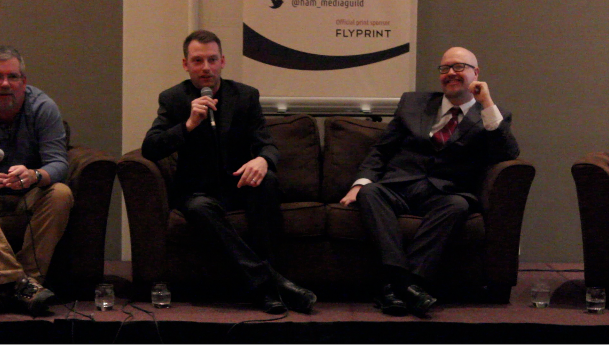
Martinus Geleynse and Jamie Smith
MGI Media has proven time and time again that it has made Hamilton its home and here to stay by laying down this foundation of various ventures staking a claim in Hamilton's media world.
The interesting the thing is, because this is all that I do, it needs to in some way make money. It doesn't always, and that's the struggle with media. So I would love to say there is some special sauce which is just working, but the truth is, its extremely difficult.
At Urbanicity, I know has gone through some rocky terrain over the last year and you're going to see some major changes over the course the next few months. There is going to be a big Re-launch in May actually, so I don't know. Some things we are doing are working and some things we do are not working.
And I think that's why I'm excited for this conversation tonight and to be apart of, and to hear where everyone else's minds are at... where what we do on multi-platform will ultimately fit in to that.
mdash; Martinus Geleynse
GigaOm began in 2006 as a blog by one writer, Om Malik, and has grown into one of the most credible and insightful voices at the intersection of business and Technology. Gigaom audience is global and the "business model" behind Gigaom is using multiple streams of revenue to sustain itself.
Some of those streams include advertising dollars on their online website, a series of 4 or 5 conferences a year they host, and selling proprietary research to companies about specific industry sectors.
We are venture funded so we raise venture financing, which means we're not profitable but we are desperately trying to become profitable. It would be a lot easier to say we are non-for-profit because then we wouldn't have to try and make a profit, but we do try.
— Mathew Ingram
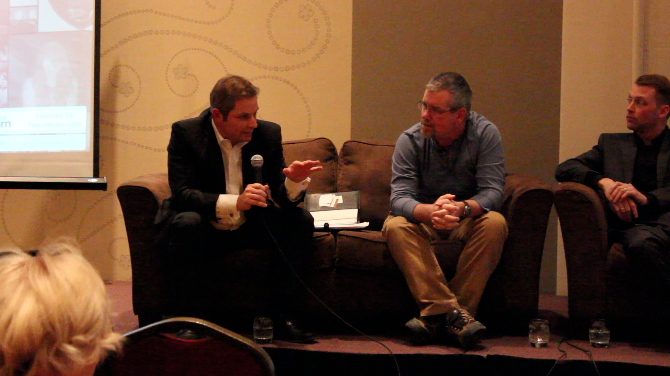
Jim Poling and Matthew Ingram
One of the main key points from the opening dialogue was how each individual panelist defined success. Each member had a different approach to how they defined their success in what they do with a clear sense of vision as to why to do what they do in the first place.
When asked if Raise the Hammer is at the epitome of success or they would ever consider advertising revenue to help sustain the site, Ryan McGreal stated:
It's a question we go back and revisit from time to time. But we are at a point now where Raise the Hammer is sustainable in the sense that it doesn't cost us more money than we can afford and it doesn't take more work than we can put into it.
This shows Ryan's dedication to stay as authentic and true to the vision of Raise the Hammer as the first day it was conceived without having the notion that money means success.
Jamie Smith of In the Neighbourhood shared his vision with this statement:
My vision of it is just to do it for so many years and just leave it as a legacy on the internet where at some point someone will go and say that was actually going on, I didn't know that, I wonder what that person is doing now.
Martinus Geleynse of Urbanicity shared his vision when he explained why Urbanicity was created in the first place.
We started Urbanicity because we were quite frustrated, no offence to Jim at all, but with the The Spectator's coverage of the 2010 municipal election. There were 20 candidates running in ward two and there were two articles printed about the ward two race and one of them was about Matt Jelly shaving his beard.
Now, I'm not saying this out of frustration because I ran against him in the ward two election and he beat me fair and square, but the man shaved his beard, and that warrants an article half page with a picture? And I'm sure there was a decision making behind that, we were so frustrated. We had said there are people reading print other wise The Spec would have been evaporated, so they are reading print.
And so they started Urbanicity.
But what we found was a very interesting audience. Every month I get a phone call from this lovely woman, she's 86 in the Augusta Senior's tower and she wants to talk about the last issue... now she's not our only reader, obviously, but it's interesting because she would not have found us online, she would not have found us on twitter.
And so now we are now building a digital site as well because you simply have to, I think. But there was just a big open space we found in the market for long form conversation about hyper local topics in print format.
Martinus's statement about being frustrated with local coverage is highly relatable. I felt that frustrated about media coverage after I went to my first DemoCamp two years ago. I was completely inspired by what I saw, what Kevin Browne was doing at Software Hamilton and often wondered, why isn't there more coverage? Why wasn't someone out there, aside from the Mohawk College students covering what was happening in our city?
And that's when I came up with the concept of TechTalk4HamOnt which later was morphed into TechTalk X Series. I wanted to give the people who demoed on stage a platform in which they can share their passion project.
While I don't make a single cent on what I do, my success is defined by being able to inspire others to go out and create more.
I believe a lot of projects that people start in our city and in other cities as well are motivated out of frustration. That's when passion plays a big role, especially if you don't get paid for doing what you do. While it would be nice to get paid for doing what you love, it does not define success.
Which leads me to the second key point observed during the course of the panel discussion: passion. Passion is the driving force in which keeps most projects going, especially when there is no payment transaction being made. The majority of work that you will do is through your own blood, sweat and tears, a labour of love for knowing that you are a part of something that is bigger then just being able to get a paycheck at the end of the week.
Journalism - more specifically, journalism in this digital age - is relatively new to all of us. There are some who are chasing the money, trying to make a profit out of their passion, which sometimes works and other times does not. When it doesn't work, most just give up, however, there are some cases where people just push forward regardless and continue to do what they do.
A problem arises when we try to superimpose a general business model upon new media format, expecting it to have the same successful outcome as traditional media.
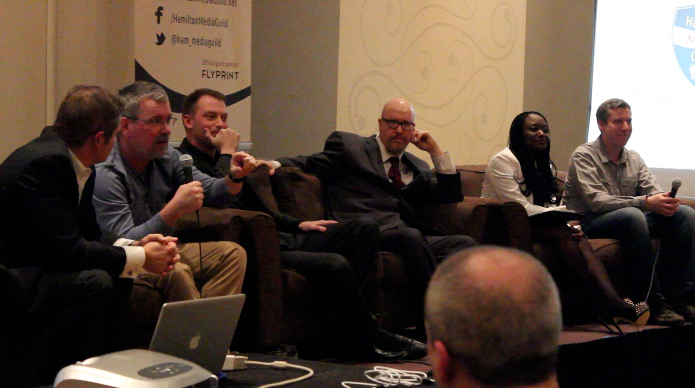
The panel
Just remember one thing, traditional media has had decades upon decades to build and grow their audience. They spend enormous amounts of money on advertising dollars just to be seen and or heard doesn't mean that particular audience is paying attention. And in this fast-paced digital age, traditional media is failing to see how people are interacting and reacting to the media that they consume.
Because of social media sites such as Twitter, Facebook, and Youtube, we want our news updates to be quick and responsive. Which is exactly why someone like Joey Coleman is so successful. Being as mobile as he is, someone can tweet to him an accident, he goes and checks out the scene and can be up online, streaming video of the accident almost instantly.
And because he does have a journalistic background he is able to find the sources, conduct the interviews, and proceed to inform the general public just as quickly as possible through streaming media on youtube, and using Facebook and Twitter as the vehicle to get his message out there.
Then he archives footage online for others to see later, who might not have been able to catch the live stream as it happened.
It is this passion for covering newsworthy events, events that usually don't get seen by the general public, that creates value in what Joey Coleman does for our city.
And with all our various ways to communicate and transmit our message, who becomes our biggest competition as independent journalist / journalist with a title and a paycheque. Is it mainstream media? The other independent journalist next door? Or possibly ourselves?
I have yet to see an overlap in which a conflict of interest may arise with two parties covering the same topic such as politics, entertainment, music or sports. And even if there were, every voice is unique in which what they have seen and or heard.
As May-Marie Duwai-Sowa put it:
I think that's the beauty of us because I think that we complement to a large extent. Because again because you are on the web you are really speaking to a global audience, and probably only when we realized looking at our followers on Twitter or Facebook that it is so wide we're not just in Hamilton when we look at our stats.
We've had over 50,000 views and just from all over. So I think we are not in competition. If anything we are complementing each other. And just giving that bulk of information out to the public to really just have various avenues of information. So I think that's the beauty of it.
That is when we also have a responsibility to help one another grow as a community of passionate individuals sharing information.
We have a responsibility as professional news journalists. I'm professionally trained, I've worked for Maclean's Magazine and the Globe and Mail. We have a responsibility to actually to do workshops and train people on journalism so the act of journalism improves.
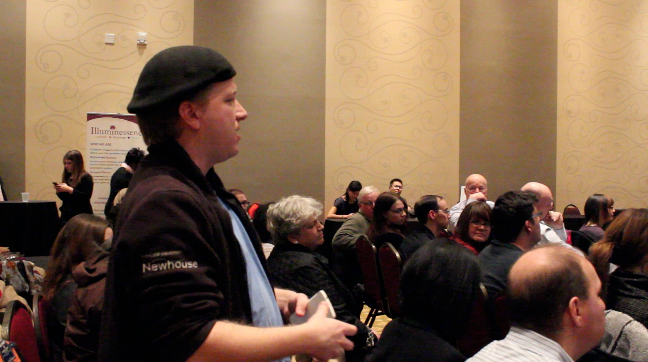
Joey Coleman
Which I thought was a fantastic idea. Lets put a scenario out there: you're a media student just graduating from college or university, taking either television broadcasting or journalism. Your future is full of hope and promise and you are ready to get out into the "real world" and make your mark.
The only thing is, established media companies are not hiring in your local city. You start widening your search, but you're already in debt from college and or university, which makes the move to a bigger city difficult.
So you take on a couple part-time jobs just to dig yourself out of the hole. And by the time you're ready to pursue your dreams of being an active journalist, with a title and a paycheque, you ran out of steam and lost that sense of passion within you.
And this is another reason why people start to actively pursue a dream through blogging. Not only is it just a great way to keep exercising the act of journalism through your other passion. It also provides real world portfolio experience you can then show other media outlets.
This is exactly why we need to remove this wall we create for ourselves between what defines us as storytellers, regardless of the fact of this person collects a pay-cheque at the end of the week and has a title, while that person just merely writes on his own site that he has built from scratch.
And stop thinking of "Us Vs Them" when it comes to independent journalists & traditional media journalists. We are merely journalists sharing information and emotion.
As Jamie Smith said:
You are better to share the other person's information and connect with them. In radio we never went on air and said big shout out to someone over at Y108, you would never mention [anyone else]. You were the only thing on the planet and that's it. But on the internet, doing a blog or doing independent journalism... Everyone is sharing this information.
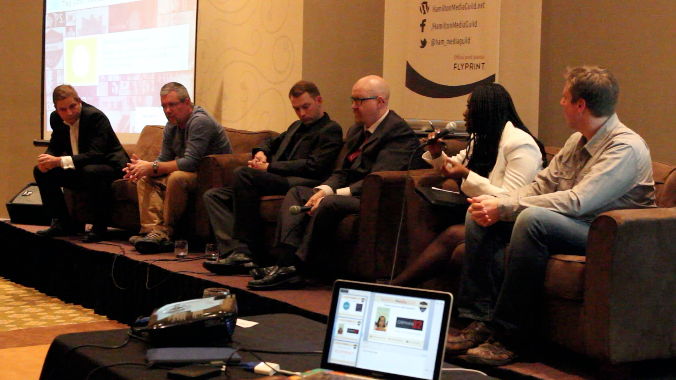
May-Marie Duwai-Sowa talking
Vincent Van Gogh, a post-impressionalist painter, created some of the most stunning pieces of art of his time. In his lifetime he only sold one single painting, but his work is priceless now. Does that make him less of a painter? I think not! He is, he was and forever will be a painter, a gifted painter at that.
So does a title and a paycheque dismiss what is within you as storytellers / journalists? Matthew Ingram said:
It is pretty amazing when you think about it, when you can produce something for almost nothing - for dozens of dollars maybe to host your site. Then it's just people who feel like writing for you, and you can theoretically reach an incredibly large amount of people.
That's really never been possible before. You had to spend so much money on printing, or publishing, or radio and T.V had to have all this equipment. I mean still you can do those things as it grows, but, it really is amazing what you can do for virtually nothing.
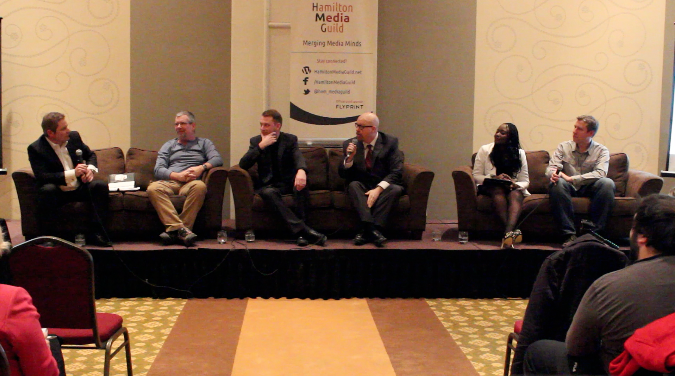
Jamie Smith talking
And now my final thoughts about Doing Media Differently: this is just the beginning. While there are some who are truly gifted at what they do, I would say over all Hamilton is still lagging behind in some respects.
Posting content, creating a blog or a podcast this is nothing new. We are still playing catch-up with the rest of the world as what we accept into our homes as the preferred choice of content that even mainstream media in our own backyard can't even learn to accept, and, co-exist.
Our differences might create oceans between us but our similarities keep us tighter than ever, otherwise we would not be having this conversation in the first place.
Our strength lies not in creating rifts, or segregating one group of individuals in one section and mass-media in another. For those lines have already been blurred beyond recognition.
It is not the title that defines you but the act of what you do. If you wish to write about politics in your city, then do so and you will be a writer.
If you capture something with your video camera and tell the stories of your city then you are a journalist and or storyteller.
And the only competition you have is within you, to make the next piece you create better and better.
Let your passion be your guiding force behind what ever it is you decide to do. The possibilities are limitless.
And the only person who can prevent you from doing what you love to do, regardless of that paycheque, is you.
Finally, share the gratitude for your experiences by passing on the valuable knowledge your trials and tribulations have taught you to make other individuals better storytellers.
Let's strengthen our bond as storytellers, develop a deep sense of respect for what each individual brings forward and help each other grow as one flourishing creative community.
This article was first published on Michael Canton's website.
By Mal (anonymous) | Posted February 21, 2014 at 09:11:36
Fostering other voices is key. Joey Coleman's working philosophy is sound, and it's good to see Torstar staff (Poling) and alums (Mousavi, Linott, Gillespie) actively contributing as well.
The author is correct that Hamilton is still lagging behind in some respects. Diversity, for example, is a strength that is perhaps under-represented.
By scrap (anonymous) | Posted February 21, 2014 at 17:25:23
It was an interesting event and yes we have many talented people in the city.I would like to pay homage to one who has left us,however was a leader on this new era. Maggie Hughes and her work,The Other Side was a forerunner. Her work,her messaging about environmental and poverty issues were very important.She always was professional. I miss her.
By OffthecurbTV (anonymous) | Posted February 21, 2014 at 19:46:39
Great read! Diversity is key! Couldn't agree more.
You must be logged in to comment.
There are no upcoming events right now.
Why not post one?